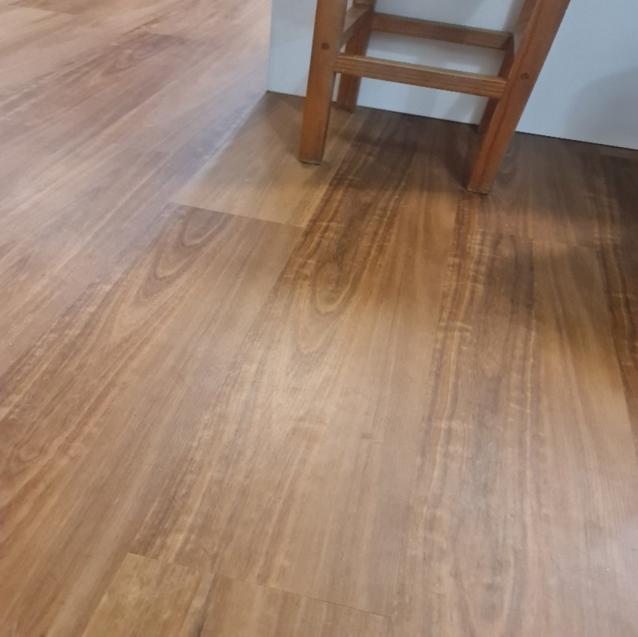
Advantages and Disadvantages of Composite Decking
By Ezy Decking|October 01, 2024
If you're aiming to turn your outdoor space into an ideal spot for relaxation and family gatherings, decking is one of the most flexible solutions. With a variety of materials to choose from, how can you decide which is the best fit? Composite decking has gained popularity in Sydney, but is it the right option for you?
In this guide, we’ll delve into the advantages and disadvantages of composite decking, specifically for Sydney homeowners.
What is Composite Decking?
Unlike traditional timber, composite decking combines wood fibres with recycled plastic, resulting in a strong and durable material that replicates the appearance of wood while offering several contemporary advantages. However, like any material, it comes with its own set of drawbacks. Let's begin by exploring the benefits.
Advantages of Composite Decking
High Durability in Sydney's Diverse Climate
Sydney's warm summers and occasional heavy rains can wear down outdoor materials over time. One key advantage of composite decking is its ability to withstand these changing conditions. Designed to resist UV damage, fading, mould, and mildew, composite materials are well-suited for Sydney's varied climate. Unlike traditional wood, composite boards won’t expand, crack, or warp, so you won’t need to worry about deterioration after wet or humid weather.
Low Maintenance
A major draw of composite decking is its low maintenance requirements. While traditional timber decking in Sydney homes would need regular staining, sealing, and sanding to stay in good shape, composite boards only require occasional cleaning. This allows you to spend less time maintaining your deck and more time enjoying it.
Stain Resistant
Another notable advantage of composite decking is its resistance to stains from everyday spills, making it perfect for an outdoor space where you, your family, and friends can gather. You won’t need to worry about food or drink spills leaving unsightly marks on your deck. Composite boards are specifically designed to resist stains from things like coffee, wine, or BBQ sauce, making them an excellent choice for homes that frequently entertain outdoors.
Aesthetics and Versatility
Composite decking provides design versatility that natural wood often lacks, with a broad selection of colours and finishes to suit your style. Whether you prefer a sleek modern grey or a classic wood-like brown, you can find a shade that complements your home perfectly. Some brands even offer composite boards with wood grain textures for a more natural appearance. Explore our extensive range of composite decking options available in Sydney.
Eco-Friendly
Opting for composite decking instead of timber can greatly lessen your environmental impact. Composite decking is made from recycled materials like reclaimed wood fibres and plastics, reducing the demand for new lumber and helping to minimize landfill waste. This not only benefits the environment but also supports a circular economy by repurposing materials that would otherwise be discarded. Additionally, composite decking doesn’t require the harmful chemical treatments used for timber, making it a more eco-friendly option for environmentally conscious homeowners.
Long-Lasting
Composite decking is built for durability, making it an ideal choice for families with pets or children. It withstands heavy foot traffic and is far more resistant to scratches, stains, rot, decay, and insect damage than traditional wood. Its long-lasting nature ensures your deck will maintain its appearance for years with minimal need for repairs.
Safe for Families
Safety is a top priority for many homeowners, especially those with children or pets. Unlike traditional wood, composite decking won’t splinter, providing a smooth and safe surface for little feet and paws. You can let your kids run around barefoot without worrying about painful splinters, making composite decking a practical and family-friendly choice for Sydney homes.
Disadvantages of Composite Decking
Although composite decking offers numerous benefits, it’s essential to weigh the drawbacks before making your choice.
Higher Upfront Cost
When compared to inexpensive timber decking in Sydney, composite materials can have a higher upfront cost. However, many homeowners believe that the long-term savings on maintenance and repairs make the initial investment worthwhile. Although timber decking may appear cheaper initially, the lower upkeep costs over time can make composite a more cost-effective choice.
Can Fade Over Time
Although composite decking is engineered to resist fading, darker colours may still experience some fading after extended exposure to sunlight, especially in high UV areas like Sydney. While most composite boards feature UV-resistant properties, a degree of fading is inevitable, particularly in sunny conditions. Choosing lighter shades can help minimize this effect.
Lack of Customisation Once Installed
When selecting a colour or style for your composite deck, it's essential to choose something you’ll love for years to come. Unlike wood, composite boards cannot be easily repainted or restained. Once installed, you're essentially committed to that colour. Therefore, it’s vital to choose a style and shade that you are completely satisfied with before installation.
Doesn't Contribute as Much to Property Value
Installing a deck can enhance your home's usable living space, but the choice of material doesn't always translate to an increase in property value. A well-designed deck can be a strong selling point, but whether it’s made of composite or wood may not significantly influence buyers. Therefore, if your primary goal is to boost property value, don’t anticipate that composite decking will provide a substantial advantage over natural wood in the real estate market.
It's Not 'Real' Timber
For homeowners who appreciate the natural beauty and texture of timber, composite decking may not fully satisfy. Although modern composite decking does a great job of mimicking wood, it can never completely replicate the genuine grain or feel of real wood. If you cherish the rustic charm and aroma of timber, even high-quality composite decking in Sydney might still come across as somewhat artificial.
Conclusion
So, is composite decking the right option for your outdoor space? It ultimately depends on your priorities. If you’re seeking a more budget-friendly or customizable option, traditional timber may be a better fit. However, if you want a durable, low-maintenance solution, composite decking is an excellent choice. Check out our selection of Sydney composite decking solutions.
In this guide, we’ll delve into the advantages and disadvantages of composite decking, specifically for Sydney homeowners.
What is Composite Decking?
Unlike traditional timber, composite decking combines wood fibres with recycled plastic, resulting in a strong and durable material that replicates the appearance of wood while offering several contemporary advantages. However, like any material, it comes with its own set of drawbacks. Let's begin by exploring the benefits.
Advantages of Composite Decking
High Durability in Sydney's Diverse Climate
Sydney's warm summers and occasional heavy rains can wear down outdoor materials over time. One key advantage of composite decking is its ability to withstand these changing conditions. Designed to resist UV damage, fading, mould, and mildew, composite materials are well-suited for Sydney's varied climate. Unlike traditional wood, composite boards won’t expand, crack, or warp, so you won’t need to worry about deterioration after wet or humid weather.
Low Maintenance
A major draw of composite decking is its low maintenance requirements. While traditional timber decking in Sydney homes would need regular staining, sealing, and sanding to stay in good shape, composite boards only require occasional cleaning. This allows you to spend less time maintaining your deck and more time enjoying it.
Stain Resistant
Another notable advantage of composite decking is its resistance to stains from everyday spills, making it perfect for an outdoor space where you, your family, and friends can gather. You won’t need to worry about food or drink spills leaving unsightly marks on your deck. Composite boards are specifically designed to resist stains from things like coffee, wine, or BBQ sauce, making them an excellent choice for homes that frequently entertain outdoors.
Aesthetics and Versatility
Composite decking provides design versatility that natural wood often lacks, with a broad selection of colours and finishes to suit your style. Whether you prefer a sleek modern grey or a classic wood-like brown, you can find a shade that complements your home perfectly. Some brands even offer composite boards with wood grain textures for a more natural appearance. Explore our extensive range of composite decking options available in Sydney.
Eco-Friendly
Opting for composite decking instead of timber can greatly lessen your environmental impact. Composite decking is made from recycled materials like reclaimed wood fibres and plastics, reducing the demand for new lumber and helping to minimize landfill waste. This not only benefits the environment but also supports a circular economy by repurposing materials that would otherwise be discarded. Additionally, composite decking doesn’t require the harmful chemical treatments used for timber, making it a more eco-friendly option for environmentally conscious homeowners.
Long-Lasting
Composite decking is built for durability, making it an ideal choice for families with pets or children. It withstands heavy foot traffic and is far more resistant to scratches, stains, rot, decay, and insect damage than traditional wood. Its long-lasting nature ensures your deck will maintain its appearance for years with minimal need for repairs.
Safe for Families
Safety is a top priority for many homeowners, especially those with children or pets. Unlike traditional wood, composite decking won’t splinter, providing a smooth and safe surface for little feet and paws. You can let your kids run around barefoot without worrying about painful splinters, making composite decking a practical and family-friendly choice for Sydney homes.
Disadvantages of Composite Decking
Although composite decking offers numerous benefits, it’s essential to weigh the drawbacks before making your choice.
Higher Upfront Cost
When compared to inexpensive timber decking in Sydney, composite materials can have a higher upfront cost. However, many homeowners believe that the long-term savings on maintenance and repairs make the initial investment worthwhile. Although timber decking may appear cheaper initially, the lower upkeep costs over time can make composite a more cost-effective choice.
Can Fade Over Time
Although composite decking is engineered to resist fading, darker colours may still experience some fading after extended exposure to sunlight, especially in high UV areas like Sydney. While most composite boards feature UV-resistant properties, a degree of fading is inevitable, particularly in sunny conditions. Choosing lighter shades can help minimize this effect.
Lack of Customisation Once Installed
When selecting a colour or style for your composite deck, it's essential to choose something you’ll love for years to come. Unlike wood, composite boards cannot be easily repainted or restained. Once installed, you're essentially committed to that colour. Therefore, it’s vital to choose a style and shade that you are completely satisfied with before installation.
Doesn't Contribute as Much to Property Value
Installing a deck can enhance your home's usable living space, but the choice of material doesn't always translate to an increase in property value. A well-designed deck can be a strong selling point, but whether it’s made of composite or wood may not significantly influence buyers. Therefore, if your primary goal is to boost property value, don’t anticipate that composite decking will provide a substantial advantage over natural wood in the real estate market.
It's Not 'Real' Timber
For homeowners who appreciate the natural beauty and texture of timber, composite decking may not fully satisfy. Although modern composite decking does a great job of mimicking wood, it can never completely replicate the genuine grain or feel of real wood. If you cherish the rustic charm and aroma of timber, even high-quality composite decking in Sydney might still come across as somewhat artificial.
Conclusion
So, is composite decking the right option for your outdoor space? It ultimately depends on your priorities. If you’re seeking a more budget-friendly or customizable option, traditional timber may be a better fit. However, if you want a durable, low-maintenance solution, composite decking is an excellent choice. Check out our selection of Sydney composite decking solutions.



